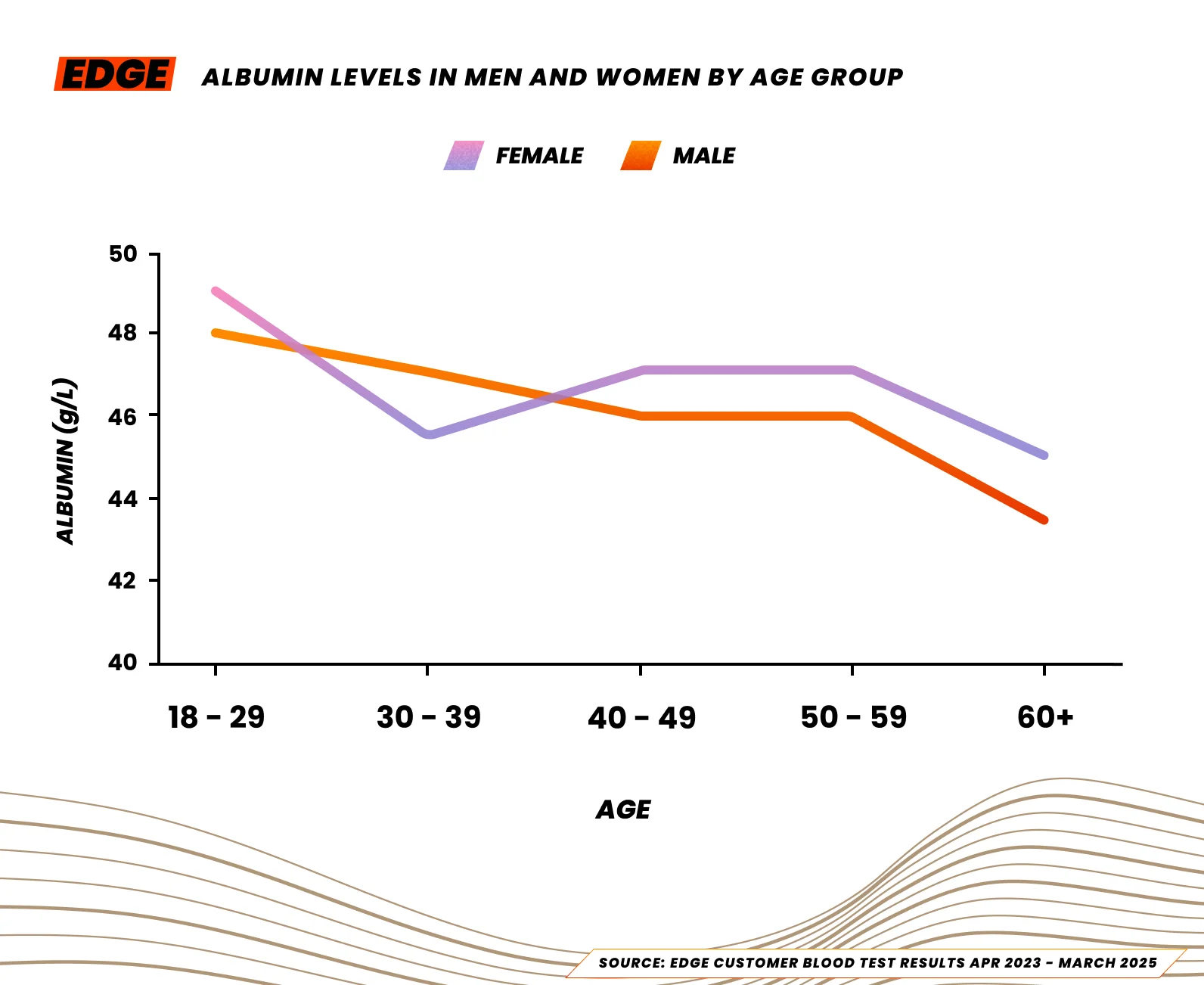What is Albumin & why is it important for athletes?
1 min read
Published on
May 22, 2025
Written by
EDGE
Share this article
What Is Albumin?
Albumin is the most abundant protein in your blood plasma. It’s produced by the liver and plays helps to maintain fluid balance, transport hormones and nutrients, and support recovery from physical stress.
While often overlooked, albumin can provide insight into your nutritional status, inflammation, hydration, and overall recovery – all key factors for athletic performance.

"Albumin is a protein produced by the liver that helps maintain fluid balance and transport hormones, vitamins, and drugs through the bloodstream. In athletes, low levels can indicate poor nutritional status, inflammation or overtraining. I recommend testing albumin every 6–12 months, particularly if you're managing a high training load or recovering from illness. Pairing it with liver function tests and hs-CRP offers a broader view of your recovery, immune health and overall protein status."
Why Albumin Is Important for Athletes
-
Fluid & Nutrient Transport
Albumin helps carry essential compounds like hormones, vitamins, and medications through the bloodstream. It also regulates the movement of fluid between tissues and blood vessels, which are essential functions for hydration and muscle function.
-
Recovery from Training Stress
During physical stress or inflammation, albumin levels may drop. Persistently low levels can signal poor recovery, overtraining, or underlying illness.
-
Nutritional Marker
Albumin reflects long-term protein status. Inadequate protein intake can lower levels, especially in athletes with high turnover from training.
What are normal albumin levels for athletes?
We looked at blood test data from EDGE customers and found the median albumin levels for men and women are 47 g/L.
Here is a breakdown of albumin levels by age and gender:
| Table 1: Albumin Levels in Men and Women by Age Group (g/L) | ||
| Age Group | Female | Male |
| 18-29 | 49 | 48 |
| 30-39 | 45.5 | 47 |
| 40-49 | 47 | 46 |
| 50-59 | 47 | 46 |
| 60+ | 45 | 43.5 |
Source: EDGE customer blood test results Apr 2023 – March 2025.
The labs we used to analyse blood samples state a healthy range for albumin is between 35 g/L and 50 g/L.

What Can Affect Albumin Levels?
-
Intense or prolonged physical training
-
Poor protein intake or malabsorption
-
Chronic inflammation or illness
-
Dehydration (may falsely elevate levels)
-
Liver function issues
What Can Affect Albumin Levels?
-
Intense or prolonged physical training
-
Poor protein intake or malabsorption
-
Chronic inflammation or illness
-
Dehydration (may falsely elevate levels)
-
Liver function issues
Symptoms Linked to Low Albumin
-
Fatigue or prolonged soreness
-
Poor recovery from training or injury
-
Oedema (fluid retention)
-
Increased susceptibility to illness
-
Signs of under-nutrition or low protein status
Why Test Albumin?
-
As part of a recovery or inflammation panel
-
If under-fuelling, losing weight unintentionally, or restricting protein
-
When experiencing persistent fatigue or performance decline
-
To support diagnosis of overtraining or RED-S
-
Alongside markers like CRP, urea, and total protein for full context
How to Optimise Albumin Levels
-
Ensure adequate daily protein intake (1.2–2.0 g/kg for most athletes)
-
Address gut health and absorption issues if relevant
-
Avoid training through illness or under-recovery
-
Include a variety of protein sources (animal or plant-based)
-
Stay hydrated, especially around training sessions
In Summary
-
Albumin reflects hydration, protein status, and recovery capacity
-
Low levels may indicate poor nutrition, inflammation, or overtraining
-
Useful in assessing stress, recovery, and overall health in athletes
-
Best interpreted with CRP, urea, liver enzymes, and dietary context
Check Your Album Levels
Check and monitor your albumin levels from home with our sports blood tests.
Get 10% off your first order
Want regular tips on how to make the most of your results? Join our newsletter and we'll give you 10% off your order!
Get the knowledge
Get expert advice to help you improve your results.
Go to our knowledge center


